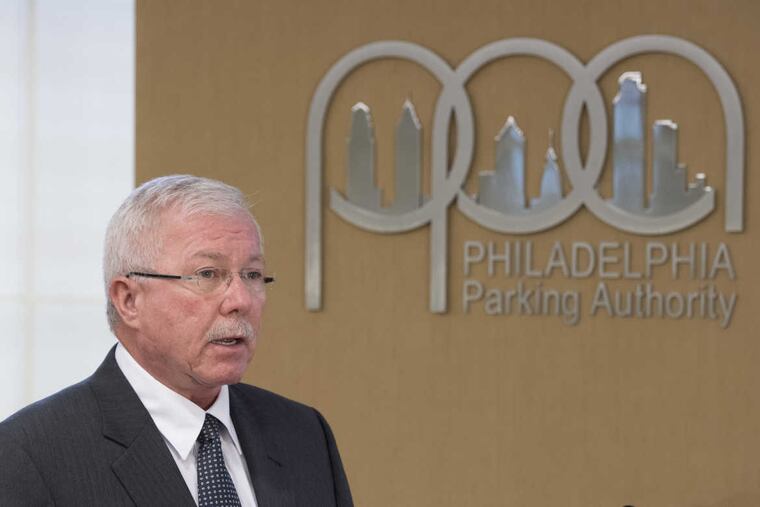Commentary: On parking and more, PPA due for an overhaul
By Emily Hamilton Pennsylvania Auditor General Eugene DePasquale is preparing to investigate the Philadelphia Parking Authority (PPA) because of multiple sexual-harassment complaints against its ousted executive director. The scandal has brought to light a general lack of transparency at the agency. A byproduct of fixing this transparency problem - which should focus first and foremost on rooting out sexual harassment - may be more scrutiny of the PPA's broader purpose and effect on city residents.

By Emily Hamilton
Pennsylvania Auditor General Eugene DePasquale is preparing to investigate the Philadelphia Parking Authority (PPA) because of multiple sexual-harassment complaints against its ousted executive director. The scandal has brought to light a general lack of transparency at the agency. A byproduct of fixing this transparency problem - which should focus first and foremost on rooting out sexual harassment - may be more scrutiny of the PPA's broader purpose and effect on city residents.
The authority was established in 1950 to meet the demand for parking in the city's central business district. The organization is tasked with providing "adequate" parking for residents, businesses, and visitors. Over the decades, however, the PPA's mission has expanded to include management of parking meters and regulating transportation options.
Anyone who has driven in Philly knows that parking can be a challenge. As a colonial city, it was built with narrow streets and dense development at a pedestrian scale. Even though the city has grown substantially over the last 300 years, many of the narrow streets remain. Because parking is so scarce, and demand is so high, basic economic analysis tells us that it should be relatively expensive. And indeed, many of the private parking garages in Center City charge upward of $10 per hour.
But the PPA sets the prices for the most convenient and valuable spaces along curbsides throughout the city, with no regard for the supply and demand of parking. In doing so, it fails to recognize the value of the street parking it manages.
By failing to adequately price its product, the PPA is doing a huge disservice to Philadelphians looking for parking. The highest street parking rates in the city are set at $2.25 per hour. This is far below the $10 market rate. As a result, drivers circle around looking for these underpriced spots, wasting time, burning gas, and contributing to unnecessary traffic.
There are alternatives to this inefficient, and otherwise counterproductive, approach. Take, for example, San Francisco. The city's SFPark system varies prices around the city with the goal of maintaining one to two unoccupied spots on each block.
On blocks where demand for parking is low, meter rates fall to 50 cents per hour to incentivize people to park in these farther flung spots. In areas of the city with the highest demand (specifically the blocks surrounding the ballpark on game day), meter prices have risen up to $7 per hour. SFPark adjusts these prices periodically to respond to changes in demand.
When drivers have to pay a higher rate to use prime real estate to park, some people will choose to use alternatives rather than driving downtown. One of Philadelphia's greatest assets is its traditional urban development that creates a charming and walkable environment. Having drivers pay market rates for parking will inevitably lead to people choosing to walk between destinations while they're downtown. Others may choose alternatives, such as public transit or taxis, when they're traveling within the downtown core. Overall, regardless of how people get around town, introducing variable pricing would reduce congestion.
Sadly, failing to adequately price parking is not the only choice the PPA is making to the detriment of downtown traffic. The authority last week made the decision to define Uber and Lyft as illegal car services. A judge overturned the PPA's rule just a day after it was enacted, but the attempt underscores the authority's reticence to embrace transportation innovations. Eliminating ridesharing services would only compound traffic issues by forcing people who might choose to share a car to instead drive alone.
The PPA is long overdue for an overhaul thanks to questionable decisions about who it hires, how it treats employees, how it prices parking, and its willingness to embrace innovation. Ease of movement for residents, businesses, and visitors is essential for a thriving city. The PPA should be working to find solutions, but is instead contributing to Philadelphia's congestion and lack of parking.
While the recent scandal demonstrates that the PPA's employment practices may be stuck in the past, it is but one example of how the agency is failing to adapt to the 21st century.
Emily Hamilton is a policy research manager with the Mercatus Center at George Mason University, author of the recent study "How Land Use Regulation Affects Affordable Housing," and a writer for Market Urbanism. ehamilton@mercatus.gmu.edu